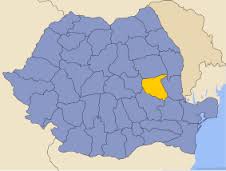 I learned a new word in Romanian today – cutremur – which means earthquake. There was “un cutremur de 5.5 grade pe scara Richter” in Romania on Sunday morning (4.37am, to be precise; many sweet dreams were disturbed). Its centre was near Focşani, the capital of Vrancea county (marked in yellow on the map). Although some reports described it as puternic (powerful) there were no reported deaths or injuries, thank goodness, or even of damage, as the quake was deep. Deep quakes apparently send out waves over a wide area – this one was felt not only in nearby cities such as Bucharest and Iaşi, but also in the surrounding countries, such as Moldova, Bulgaria and Ukraine. Shallow earthquakes’ waves don’t travel so wide in comparison but because they are closer to the surface they can cause more damage (as far as I understand the science of earthquakes). The Vrancea region is scenic and is noted for its wines, but is particularly prone to seismic activity, as it is where some tectonic geographical faults converge.
I learned a new word in Romanian today – cutremur – which means earthquake. There was “un cutremur de 5.5 grade pe scara Richter” in Romania on Sunday morning (4.37am, to be precise; many sweet dreams were disturbed). Its centre was near Focşani, the capital of Vrancea county (marked in yellow on the map). Although some reports described it as puternic (powerful) there were no reported deaths or injuries, thank goodness, or even of damage, as the quake was deep. Deep quakes apparently send out waves over a wide area – this one was felt not only in nearby cities such as Bucharest and Iaşi, but also in the surrounding countries, such as Moldova, Bulgaria and Ukraine. Shallow earthquakes’ waves don’t travel so wide in comparison but because they are closer to the surface they can cause more damage (as far as I understand the science of earthquakes). The Vrancea region is scenic and is noted for its wines, but is particularly prone to seismic activity, as it is where some tectonic geographical faults converge.
Cutremur is a neuter word, which means it acts like a masculine word in the singular and a feminine one in the plural (Romanian being a quirky language). So the plural is cutremure.
Coincidentally, perhaps, there has been a puzzling series of cutremure, or as some sites are describing it “a mysterious earthquake swarm“, in the past month or so near Galaţi, the highest one being de 3.8 grade pe scara Richter a few days ago. These have been close to the surface and have been causing damage to homes etc. Some people are blaming local mining activity and suchlike, or hearing strange bubbling sounds from some underground water system.
Here is some Romanian vocabulary related to cutremur:
- a murdări means to soil or dirty something, and a se murdăr means to get dirty.
- o murdări (noun, feminine) means dirt, filth or muck.
- murdar and murdară are the masculine and feminine adjectives for dirty and soiled.
Unrelated words are a muri, to die or perish (you would certainly want this word to be unrelated if you were ever in un cutremur); a mura, to pickle; murături are pickles, and o mură, which is a blackberry (the fruit, not the device). However, you could say in English at least that if you are in an earthquake you are also in a pickle.
The website earthquake-report.com has all the details of the Vrancea earthquake here and the Galaţi ones here.
What to do in an earthquake
How should you do to protect yourself if you happen to be somewhere where an earthquake strikes? Please read this official government advice on the Victoria State Emergency Service website. Note that it says it is very dangerous to attempt to flee a building in the middle of an earthquake; it is better to stay inside and try to take cover under a strong table or suchlike. Try to protect your head as much as possible. Stay away from glass windows and doors. Never try to escape in a lift, it is much more dangerous than the stairs.
I have experienced one earthquake in my lifetime: two months after I arrived in Australia, in 1989, there was the “Newcastle earthquake”, in which 13 people died. It was mid-morning, I was standing in my bedroom in Sydney when the room got the wobbles. It was bizarre but not particularly scary as the centre was about 200km to the north and it was over before I could comprehend what was going on (I’m a little slow). But obviously it was a different story for the people of Newcastle, NSW.

